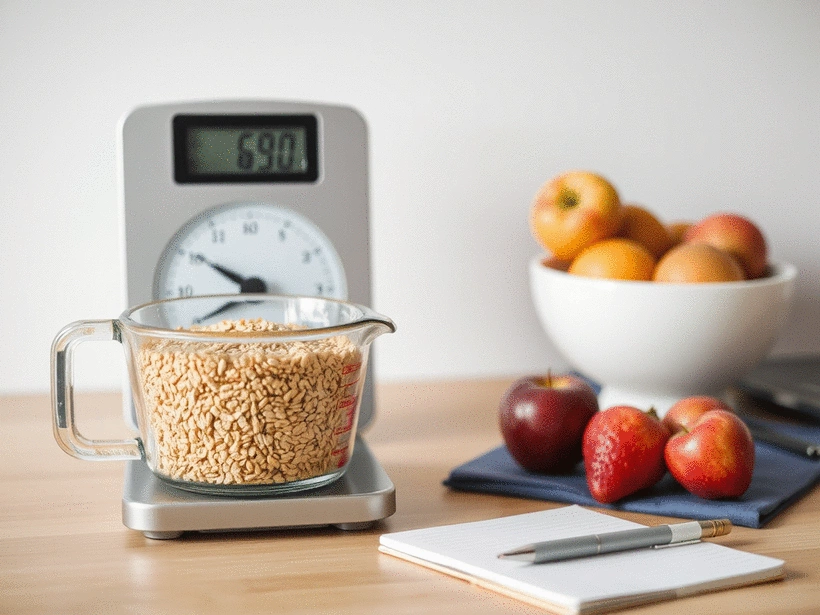Healthy Routine for Weight Gain

Have you ever thought about what 'healthy weight gain' really means? It's more than just adding numbers to the scale; it's about nurturing your body with the right nutrients and lifestyle choices. This article unveils essential insights that can help you on your journey to healthy weight gain.
What You Will Learn
- A balanced approach to weight gain emphasizes overall health and well-being, not just calorie intake.
- Nutrition plays a pivotal role in weight gain; focus on calorie-dense, nutrient-rich foods like avocados and nuts.
- Setting realistic goals, such as gaining 1-2 pounds per week, can help you stay motivated and accountable.
- Tracking progress through regular weigh-ins, body measurements, and a food diary can provide insights into your journey.
- Consulting with a dietitian or trainer can optimize your weight gain strategy, especially if you're facing challenges.
Key Pillars of Healthy Weight Gain
Achieving healthy weight gain isn't just about consuming more calories; it's a balanced, multi-faceted approach. This visual highlights the three core pillars essential for sustainable and effective weight gain: a healthy lifestyle, targeted nutrition, and consistent progress tracking.
Understanding Healthy Weight Gain and Its Importance
Are you ready to embark on your journey towards healthy weight gain? Understanding what healthy weight gain truly means is essential for you to achieve your goals! Gaining weight is not just about eating more; it’s about establishing a balanced approach that prioritizes your overall health and well-being. For more general guidance on healthy weight, the CDC provides valuable resources.
At Ways to Gain Weight, we believe that a healthy lifestyle is the cornerstone of effective weight gain. This journey isn’t just about the numbers on the scale; it’s about feeling better, looking great, and enhancing your quality of life. By focusing on healthy habits, you can transform your body and mindset in a sustainable way!

Why a Healthy Lifestyle is Key for Weight Gain
When it comes to gaining weight, a healthy lifestyle plays a critical role. Think of it as building a strong foundation for your house. Without a solid base, everything else can crumble! Here are some reasons why a healthy lifestyle is vital:
- Improved Energy Levels: Fueling your body with nutritious foods gives you the energy you need to stay active and motivated.
- Better Muscle Development: A focus on strength training and nutrient-rich diets helps build muscle, rather than just adding fat.
- Mental Well-Being: Healthy eating contributes to better mood and mental clarity, making it easier to stick to your weight gain goals.
By incorporating these elements into your daily routine, you're setting yourself up for long-term success. Embrace this journey, and you'll not only watch the scale rise but also feel a significant improvement in your overall health!
Understanding the Role of Nutrition in Weight Gain
Nutrition is the heartbeat of healthy weight gain. It’s crucial to understand how different foods can impact your journey. While it might be tempting to consume anything calorie-dense, focusing on nutritious options will provide your body with the right fuel it needs! The NHS offers healthy ways to gain weight, emphasizing nutritious choices.
- Calorie-Dense Foods: These are foods rich in calories but also packed with essential nutrients. Think nuts, avocados, and whole grains.
- Protein Sources: Incorporating lean meats, dairy, and plant-based proteins helps in muscle building.
- Healthy Fats: Foods like olive oil and fatty fish contribute to overall health while increasing caloric intake.
By prioritizing nutrition, you'll not only gain weight but also improve your body composition and health markers. Remember, it’s about quality over quantity!
Setting Realistic Goals for Healthy Weight Gain
Setting achievable goals is a game-changer in your weight gain journey. It’s important to approach this with a clear and realistic mindset. Instead of eyeing the scale, consider what you truly want to accomplish. Here’s how to set those goals effectively:
- Define Your Target Weight: Establish a healthy weight range based on your body type and height.
- Set Timeframes: Give yourself a reasonable timeline, like gaining one to two pounds per week. This allows your body to adjust.
- Monitor Progress: Track your meals and workouts to stay accountable and motivated.
As you work towards these goals, keep in mind that consistency is key. Celebrate your small achievements along the way, and remember that every step you take is a step toward your desired outcome. Let’s tackle this journey together!
Interactive Poll
What aspect of healthy weight gain are you most excited to explore? Share your thoughts below:
Tracking Progress and Adjusting Your Routine
Tracking your weight gain journey is crucial for understanding what works and what doesn't. By keeping an eye on your progress, you can make adjustments that enhance your results. Remember, it's not just about the numbers on the scale; it's about how you feel, your energy levels, and your overall well-being!
Effective tracking allows you to celebrate small victories and stay motivated. I recommend using a variety of methods to get the most accurate picture of your progress. Let’s explore some practical strategies to monitor your weight gain effectively.

How to Monitor Your Weight Gain Effectively
One of the simplest ways to keep track of your weight gain is by weighing yourself regularly. But there are other methods too! Here are some effective ways to monitor your progress:
- Regular weigh-ins: Aim for consistency by weighing yourself at the same time each week.
- Body measurements: Take measurements of your waist, hips, and arms to gauge changes in body composition.
- Progress photos: Capture your journey with photos every few weeks to visually assess your transformation.
- Energy levels and strength gains: Keep track of how you feel during workouts and daily activities.
By combining these different methods, you’ll gain a comprehensive view of your progress. Remember, weight gain is not always linear, and fluctuations can happen!
Using a Food Diary for Progress Tracking
Keeping a food diary is one of the best ways to stay accountable. It helps you monitor your caloric intake and ensures you’re eating enough to support your weight gain goals. Here’s how to get started:
- Log everything: Write down every meal and snack, including portion sizes.
- Include beverages: Don’t forget to track drinks, as they can add significant calories.
- Reflect on your feelings: Note how you feel after eating—this can help identify patterns and preferences.
With a food diary, you can adjust your diet as needed and identify any areas where you might be falling short. It's a powerful tool for anyone serious about their weight gain journey!
When to Seek Professional Guidance from Dietitians or Trainers
Sometimes, the best way to optimize your weight gain strategy is to turn to the experts. If you’re feeling stuck or uncertain about your progress, it might be time to seek professional guidance. The Mayo Clinic offers expert answers regarding weight gain and when to consult a professional. Here are a few signs that indicate you should consult a dietitian or trainer:
- You’re not seeing any weight gain after consistent effort.
- You have specific dietary restrictions that make meal planning challenging.
- You’re unsure about the right macronutrient breakdown for your goals.
- You want accountability and expert advice to keep you motivated.
Working with a professional can provide you with tailored strategies and support, making your weight gain journey smoother and more effective. Remember, at Ways to Gain Weight, we believe in the power of community and expert knowledge to help you achieve your goals!
Recap of Key Points
Here is a quick recap of the important points discussed in the article:
- Adopt a Balanced Approach: Focus on nutritious foods and a healthy lifestyle rather than just increasing calorie intake.
- Emphasize Nutrition: Prioritize calorie-dense foods like nuts, avocados, and lean proteins to fuel muscle growth and overall health.
- Set Realistic Goals: Define your target weight and set achievable timelines to track your progress effectively.
- Monitor Your Journey: Use regular weigh-ins, body measurements, and food diaries to keep track of your progress and adjust your routine as needed.
- Seek Professional Help: Consult dietitians or trainers if you're not seeing progress or need tailored guidance.
Frequently Asked Questions (FAQs)
- What does 'healthy weight gain' truly mean?
- Healthy weight gain means nurturing your body with the right nutrients and lifestyle choices, focusing on overall health and well-being, not just increasing numbers on the scale. It involves a balanced approach to nutrition and a healthy lifestyle to build muscle and improve health markers.
- What role does nutrition play in healthy weight gain?
- Nutrition is crucial for healthy weight gain. It involves focusing on calorie-dense, nutrient-rich foods such as nuts, avocados, whole grains, lean meats, dairy, plant-based proteins, olive oil, and fatty fish. These provide the necessary fuel for muscle building and overall health.
- How can I set realistic goals for weight gain?
- Realistic goals include defining a target weight based on your body type, setting reasonable timeframes (e.g., gaining 1-2 pounds per week), and monitoring your progress through meals and workouts. Consistency is key, and celebrating small achievements helps maintain motivation.
- What are effective ways to track progress during a weight gain journey?
- Effective tracking methods include regular weigh-ins (at the same time each week), taking body measurements (waist, hips, arms), capturing progress photos, and monitoring energy levels and strength gains during workouts. Keeping a food diary is also essential for monitoring caloric intake.
- When should I consider seeking professional guidance for weight gain?
- You should consider consulting a dietitian or trainer if you're not seeing weight gain despite consistent effort, have specific dietary restrictions, are unsure about macronutrient breakdown, or need accountability and expert advice. Professionals can provide tailored strategies and support.




